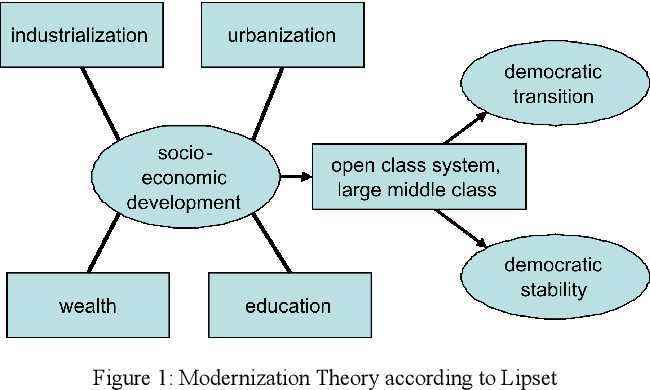Political Development & Modernisation

Introduction
Political development and political modernisation are one of the most important concepts in political science with a lot of controversy about their definitions and contents. I will try to explain them but expect some headaches.
What is Political Development?
I will define it as the process whereby a political system increases its capacity and capability to successfully respond to the challenges it is facing by improving its structures, processes, and culture.
Political structures refer to the institutions created, and the legal-regulatory framework formulated for their internal functioning and also to interact with other institutions for the smooth running of the political system.
Examples of these political structures are the constitution and the various enactments passed under it, the office of the president, two houses of the parliament and its standing committees, the election commission, election tribunals etc.
Political processes refer to the activities carried out by political structures for carrying out their constitutionally mandated functions i.e., voter registration, constituency delimitations, holding of fair and free elections, policy formulation, implementation, etc.
Lucian Pye defines political culture as the set of attitudes, beliefs, and sentiments, which give order and meaning to a political process and provide the underlying assumptions and rules that govern behaviour in the political system. How political actors think and behave-simple
What are the challenges for which the political system needs to develop its capacity and capability to respond successfully?
Different writers have identified many. I will first list the four given by Almond and Powell who contributed a lot to this debate. Be patient. Drink tea.
- Challenge of State Building
State building means creating new institutions or strengthening the old ones to meet the challenges coming from within the political system, from other systems(economic, society)or from the international environment
Thus regime change with social welfare agenda will create new institutions to implement its manifesto while the one with religious agenda will create other institutions or change processes. An attack from outside will need different institutions, and a disaster will require
2. Challenge of Nation Building
Most states, particularly post-colonial ones are multi-ethnic entities; nation-building refers to gelling these diverse groups of people having tribal, ethnic, religious, & regional loyalties into a nation with a common vision and single identity
3. Challenge of Participation
People empowerment; how to cope with increasing public demand for the inclusion decision-making process. Generally put forward through such political structures as political parties, and pressure groups, it forces the ruling elite to be responsive
4. Challenge of Distribution
Equity issue; increased political participation leads to the demand that the benefits & national income should be distributed equitably among all sections of society, irrespective of caste, colour, sex and creed. Equal opportunities/Merit principle
Lucian w. Pye has outlined the different crises that the process of political development is expected to overcome. These crises are
- Identity crises
- Legitimacy crises
- Penetration crises
- Participation crises
- Integration crises
- Distribution crises.
You must have noticed that the challenges or crises Lucian Pye has listed are almost the same with different names but you must mention them in your answer to show you have thoroughly studied this topic. Kindly read pages 26–28 of this article by him https://pdf.usaid.gov/pdf_docs/PNABT526.pdf…
So what happens when the political system undergoes development? Leonard Binder who defines political development as “changes in the type and style of politics”, attributes the following five characteristics to political development.
- Change of Identity: People start shifting their loyalties from smaller entities to bigger ones, of course gradually. For example, some change from tribal to provincial and then to national. Some change from religious to national and son. Remember nation-building?
- Change in Legitimacy: The source of legitimacy for the state shifts from transcendental to immanent sources. (What he is saying in simple terms is that the state derives its legitimacy from the constitution instead of saying that it is its divine right. Objectives Resolution?
- Change in Political Participation: Patterns of political participation shift from elite to mass and from family to group. In other words, there is mass participation in politics, people voting on their own instead of the wishes of their baradari or bigwigs,
- Change of Distribution from status and privilege to achievement. People start recognising achievement as the criteria for giving respect to someone in politics instead of mere family background, wealth, status etc.
- Change in the degree of administrative and legal penetration: It means with political development state becomes strong enough to penetrate into social structure and out of the remote regions of the country. Its regulatory powers become deep and wide
Now a bit of difficulty
The definition of political development I gave in the beginning will not impress the examiner if you do not write this definition by Almond and Powell ” the increased differentiation and specialisation of political structures and the increased secularisation of political culture”
And these two also
Samuel P. Huntington-” the process by which organisations and procedures acquire values and stability”. Alfred Diamont, “process which aims at a particular condition, but creates an institutional framework for solving an ever-widening range of social problems”
What are Structural Differentiation and Specialization?
By these 2 interrelated terms, Almond & Powell mean that political development occurs when the structures in the system start shedding their extra load, concentrating on their core functions, and specializing in it.
Thus during political development, families, instead of doing everything for their children ranging from rearing them, educating them, healthcare etc, concentrate only on the first and leave schools to educate them, hospitals for their healthcare, firms for their employment etc
What is Political Secularisation?
Simply put, political secularisation is divorcing the state from religion. Thus political development in essence is these two things mentioned by Almond and Powell in their definition- institutions become specialised & state becomes secular.
So what happens when there is Political Development?
According to Almond and Powell, political development affects a political system’s FIVE capabilities meaning its ability and the extent to which the system can cope with its challenges successfully. These are
- The Extractive Capability
How far the political system is now capable of drawing material and human resources from the domestic and international environment? Can it levy and collect taxes more efficiently? Can it get loans from abroad easily and cheaply?
2. The Regulative Capability
How far the political system is now capable to enforce its laws, making people obey them, and controlling public behaviour with or without using its legitimate coercive powers? Can it catch big fish?
3. The Distributive Capability
How far the political system is capable to allocate goods, services, honours, statuses and opportunities to individuals and groups equitably, without any fear or favour? Can it prevent the power to capture the policy formulation?
4. The Symbolic Capability
How far is the political system now capable to use its value system(soft power) effectively during crises and emergency situations. Remember how in 1965, Ayub Khan mobilized the nation and armed forces through speeches and statements.
5. The Responsive Capability
How far is the political system now capable of successfully responding to internal or external pressures and demands. Disaster management? external aggression? internal sub-version? agitations?
Factors affecting speed and scope of Political Development
A political system is not a stand-alone entity though we discuss it as such for convenience of analysis. It is part and parcel of society, affects other systems and is affected by them in turn. Here are a few ways it happens
- Social System
Social System Sociocultural norms of society have a deep impact on the political system; an overly religious society will make it difficult for the political system to become secular. Literacy rate, female status, fatalistic mindset etc will slow rate of political development
2. Economic Factors
The stage of economic development of a country has much to do with political development. In fact, both go hand in hand. Economic development expands the middle class which demands greater empowerment thus speeding the process of political development
3. Political Factors
Interestingly, the nature of the political system itself has a lot to do with its development. If a country run by political elite would progress politically, impose Martial Law and the speed and scope of political development would slow down
4. External Factors
A country which is facing an existential threat from its powerful hegemonic neighbour will have to spend a lot on its defence, leaving less for economic development which as stated earlier is linked with its political development
What is then Political Modernisation?
In all social sciences, there are some concepts which are simple to understand but difficult to define. Political modernisation is one such concept. Closely related to political development, it is slightly different.
“It’s the process of development and evolution from a lower to a higher level, in which a country’s constitutional system and political life move from the superstition of authority, autocracy and the rule of man to rationality, autonomy, democracy & rule of law.” Shi Chenghu
According to Samuel Huntington, political modernization consists of three basic elements
- rationalization of authority
- differentiation of structure
- expansion of political participation.
Political modernisation manifests itself in certain types of political change, like political integration, political differentiation, and political secularisation, and enhances the capacity of a society’s political system, i.e. the effectiveness and efficiency of its performance
From the above explanations, you would notice that there is a thin red line between political development & political modernisation. There is a difference in degrees. Thus, the UK is politically modernised while India is politically developed despite having the same style of political systems.
